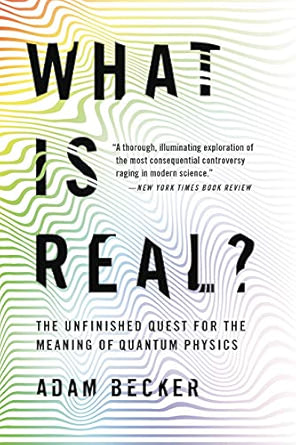More on this book
Community
Kindle Notes & Highlights
by
Adam Becker
Started reading
October 11, 2024
Thermodynamics didn’t rely on abstruse, unverifiable ideas about what was actually in the world—it simply described the world.
special relativity also consigned to oblivion the absolute space and time that Mach had so despised.
Einstein disliked the name “relativity” precisely because it connoted a kind of relativism.
“invariant theory,”
to Einstein, physics was about the world itself. “Science,” he said, “has the sole purpose of determining what is.”
Brownian motion,
but nobody had been able to satisfactorily explain it. Einstein did so masterfully—
Ludwig Boltzmann,
Boltzmann had managed to show that the statistical behavior of massive numbers of atoms led directly to the laws of thermodynamics
Einstein found
happily subscribed to the existence of atoms in order to solve the problem at hand.
Einstein not only explained a century-old puzzle, but conclusively demonstrated that Boltzmann’s statistical, atom-based approach to physics was both sound and useful.
photoelectric effect
the color of the light involved seemed to matter:
totally new particle, the photon.
Einstein could only point to the photoelectric effect itself, along with a strange quirk of the “black-body radiation law” discovered by German physicist Max Planck five years earlier.
rarely collaborated with other physicists and almost never took on students of his own.
he characterized common sense as the collection of prejudices accumulated by the age of eighteen.
Einstein finally asked Heisenberg what he really wanted to know.
principle, it is quite wrong to try founding a theory on
observable magnitudes alone.
theory which decides what we c...
This highlight has been truncated due to consecutive passage length restrictions.
infor...
This highlight has been truncated due to consecutive passage length restrictions.
would be totally incomprehensible without some kind of theory about the way the world works.
work with Bohr. Three days later, Heisenberg was on his way to Copenhagen, to once again sit at the feet of the quantum master himself.
Bohr “is like a sensitive child and walks about this world in a kind of hypnosis.”
Unlike Einstein, Bohr continually worked with other physicists.
Danish government created and funded a research institute with the sole purpose of giving Bohr an environment to work in.
scion
according to Victor Weisskopf, one of Bohr’s most brilliant students, “any physicist working with Bohr was certain to be married after no more than two years.”
Our conversations ranged from religion to genetics, from politics to art;
peculiar kind of sage—brilliant and insightful, yet plodding and obscure, sometimes infuriatingly so.
same slowness of reaction was apparent at scientific meetings.
would turn out that what he understood about the problem presented by the visitor was quite different from what the visitor meant, and was correct, while the visitor’s interpretation was wrong.
Bohr’s working style was slow, intense, and collaborative by nature.
from 1922 to 1930, Bohr did not publish a single paper alone.
writing was tortuous and obscure, with famously long and convoluted sentences.
no more clear in speech than in writing.
Bohr’s “stumbling way of talking… would become less and less intelligible the more important the subject became.”
Schrödinger had come up with wave mechanics while shacked up with his mistress
Schrödinger’s theory, meanwhile, used familiar mathematics with simple physical ideas;
erstwhile
indubitable,
Born
he managed to derive the brightness of the spectral lines in hydrogen, solving a problem that had been outstanding for more than seventy years.
in the areas they overlapped, Schrödinger’s wave mechanics gave the same results as Heisenberg’s matrix mechanics.
Schrödinger’s theory, associated with energy “eigenstates,” special wave functions with constant energies.
soon discovered, matrix mechanics and wave mechanics were mathematically equivalent,
But the two versions of quantum mechanics still differed radically in their interpretation.
Heisenberg was unconvinced.


